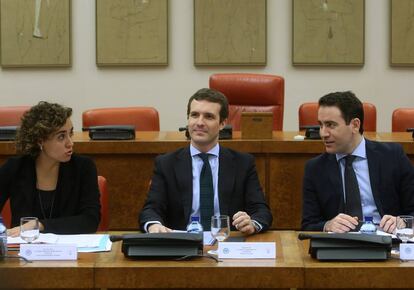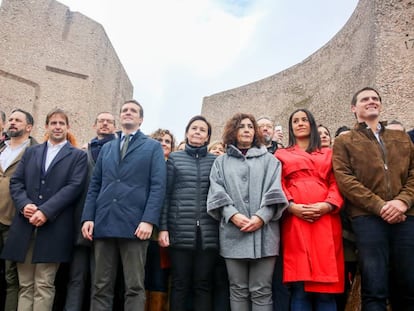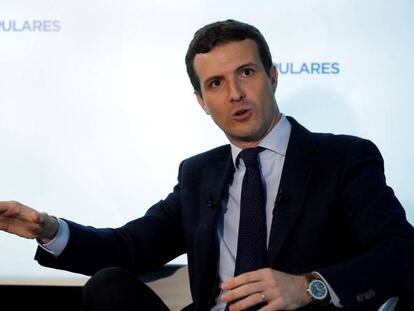As elections loom, Spain¡¯s PP ramps up rhetoric to stop voter drain
Mainstream conservatives talk tough on immigration, abortion and Catalonia to keep up with the far-right Vox, which is threatening to take supporters away at the upcoming polls

With a general election slated for April 28, and more polls due on May 26, Spanish political parties are in campaign mode. This is particularly evident in the Popular Party (PP), which is fighting to stop voters from switching allegiances in favor of Vox, the new far-right party that everyone is talking about.
The current leader of the PP, the 37-year-old Pablo Casado, has a very different style from his predecessor Mariano Rajoy, who was 63 when his government was brought down by a no-confidence vote in late May of last year.
What¡¯s at stake in these elections is the historical continuity of constitutional Spain
PP leader Pablo Casado
Unlike the low-key Rajoy, who went back to his old job at a registrar¡¯s office after leaving politics, Casado does a lot more public speaking, grants more interviews, and nearly always answers journalists¡¯ questions. Some within the conservative party even talk about ¡°over-exposure.¡±
And Vox¡¯s unexpected success at the Andalusian election last December has hardened Casado¡¯s tone as he competes with the far-right party for voters who appreciate the strong nationalist, pro-tradition and anti-immigration message delivered by Vox leaders. This has pushed the PP into a flurry of hyperbolic statements on a range of issues that matter to its voters.
1. Gender violence law. ¡°We were the first party in Spain to launch a law against gender violence in 2004. It was approved a few months later, but we¡¯re the ones who drafted it,¡± said Casado on Monday on the state broadcaster TVE. That law was unanimously passed in 2004 under the sponsorship of the Socialist Party (PSOE) government of Jos¨¦ Luis Rodr¨ªguez Zapatero. The PP leader at the time, Jos¨¦ Mar¨ªa Aznar, instead criticized ¡°generic laws.¡± And these days Casado says that ¡°it is possible to make a stalwart defense of the fight against this blot on society [gender violence] without the need to criminalize men or victimize women just because of their gender.¡±
2. Abortion. Casado says he would like to go back to the 1985 law that only allowed pregnancy terminations in very limited cases. The current legislation, which dates back to 2010, allows abortion on demand in the first trimester and statistics show that it has not caused a rise in terminations: in fact the rate has dropped from 11.78 for every 1,000 women to 10.51. Casado also argues that there was more political consensus around the 1985 law, but the fact is that Alianza Popular, the PP¡¯s predecessor, voted against it and even filed a challenge in the Constitutional Court.
3. Bullfighting, fishing and hunting. Casado has stated about the PSOE administration that ¡°its ministers¡¯ personal tastes end up being the law. If a minister doesn¡¯t like hunting, let¡¯s ban it. If she doesn¡¯t like bullfighting, let¡¯s ban it. If she doesn¡¯t like fishing and diesel engines, let¡¯s ban them. They remind one of Maduro and Ch¨¢vez.¡± There are no laws in Spain that ban hunting, fishing or bullfighting. As for diesel, the government said it will be banned from 2040 to encourage the use of renewable energies.
4. Caught in the act. On February 15, Prime Minister Pedro S¨¢nchez announced a snap general election for April 28 after his budget plan failed to secure congressional support from the PP, Ciudadanos (Citizens) and nationalist parties from Catalonia and the Basque Country. Casado, who had been denouncing alleged deals between Madrid and Catalan separatists for months, stated that ¡°there are going to be elections because we caught them negotiating, because we called on people to demonstrate in Col¨®n square,¡± he said, alluding to a march held in Madrid on February 10 against the government¡¯s handling of the Catalan independence bid. ¡°We stopped the sale of Spain.¡±
5. Right to self-determination.The parties that organized the protest in Madrid claimed that PM S¨¢nchez had accepted 21 demands made by the Catalan premier, Quim Torra, chiefly ¡°recognizing and making effective the right to self-determination.¡± Casado recently said it again: ¡°What¡¯s at stake in these elections is the historical continuity of constitutional Spain, because otherwise Spain would be something else. It would be a Spain where the right to self-determination would exist the way it was recognized months ago by the prime minister and later ratified at the disgraceful summit of Pedralbes,¡± alluding to a meeting of officials from Madrid and Barcelona in December.
6. ETA and Catalonia. ¡°The agenda we are seeing in Catalonia is ETA¡¯s agenda,¡± said Casado, stating that the northeastern region is experiencing kale borroka, (street fight in the Basque language), a form of street violence carried out for decades in the Basque Country by youths with radical nationalist sympathies. Consuelo Ord¨®?ez, the president of a terrorism victim support group and sister to Gregorio Ord¨®?ez, a PP councilor assassinated by ETA in 1995, has accused Casado of ¡°trivializing¡± the issue by comparing ¡°things that have nothing to do with one another.¡±
7. Immigrants and public aid. ¡°It is not reasonable for someone from a foreign land to have easier access to social aid or preferential treatment in health and education services,¡± said Javier Maroto, the PP¡¯s deputy organization secretary, in statements to the daily La Raz¨®n. The PSOE government has restored universal healthcare after the previous PP administration placed limits for irregular immigrants. Maroto claimed that the number of irregular migrants in Spain has ¡°quadrupled,¡± generating ¡°a security and public order problem.¡± Irregular migrant arrivals grew 131% between 2017 and 2018 and it is not cited as a main problem in citizen opinion surveys.
English version by Susana Urra.
Tu suscripci¨®n se est¨¢ usando en otro dispositivo
?Quieres a?adir otro usuario a tu suscripci¨®n?
Si contin¨²as leyendo en este dispositivo, no se podr¨¢ leer en el otro.
FlechaTu suscripci¨®n se est¨¢ usando en otro dispositivo y solo puedes acceder a EL PA?S desde un dispositivo a la vez.
Si quieres compartir tu cuenta, cambia tu suscripci¨®n a la modalidad Premium, as¨ª podr¨¢s a?adir otro usuario. Cada uno acceder¨¢ con su propia cuenta de email, lo que os permitir¨¢ personalizar vuestra experiencia en EL PA?S.
En el caso de no saber qui¨¦n est¨¢ usando tu cuenta, te recomendamos cambiar tu contrase?a aqu¨ª.
Si decides continuar compartiendo tu cuenta, este mensaje se mostrar¨¢ en tu dispositivo y en el de la otra persona que est¨¢ usando tu cuenta de forma indefinida, afectando a tu experiencia de lectura. Puedes consultar aqu¨ª los t¨¦rminos y condiciones de la suscripci¨®n digital.










































